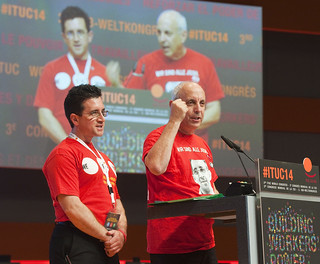Search News
For the Media
For media inquiries, call CWA Communications at 202-434-1168 or email comms@cwa-union.org. To read about CWA Members, Leadership or Industries, visit our About page.
COHEN: Worldwide Labor Alliance Must Confront Virulent Anti-Union Efforts in U.S.
CWA President Larry Cohen urged a worldwide conference of trade unionists in Germany this week to join efforts to revive and sustain the American labor movement under relentless assault from corporations and reactionary political forces.
"Without the world's attention to the crisis of labor in the U.S., anti-union corporate and conservative government policies will be exported," Cohen warned. "The consequences are dire for the rest of the world."
In a forceful speech this week at the International Trade Union Confederation (ITUC) in Berlin, he recited the now familiar but depressing data on how the U.S. trade union movement has been brought low from its peak 50 years ago of 35% private sector coverage to just 6% today. ITUC General Secretary Sharan Burrow has been a strong ally in the campaign for T-Mobile workers' rights, including coming to Charleston, S.C., last year to support call center workers.
"Our political and business leaders have for the most part adopted an ideology of greed, not partnership," Cohen said. "As a result of these types of U.S. labor polices, for the last 25 years, income and wealth in the U.S. have shifted to the wealthiest Americans. While workers' wages have stagnated, the wealth of the 1% grew. Top executives of large U.S. companies now earn 350 times more than workers."

CWA President Larry Cohen and Josh Coleman, now a TU activist, address ITUC delegates.
U.S. corporations are exporting this economic model, he continued, including right now behaving one way in Europe, where governments have strong policies supporting workers joining unions, but being virulently anti-labor at home. Multi-national corporations like Deutsche Telekom have been more than happy to respect workers' rights in their home countries while treating U.S. workers abominably.
T-Mobile is 67% owned by Deutsche Telekom, the largest shareholder of which is the Germany government. DT's German workforce has bargaining rights, and ver.di leader Lothar Schröder is the deputy chairman of the company's supervisory board, serving along with other worker representatives. In the U.S., workers who choose to organize are subjected to repeated captive audience interrogations and harassment.
Meanwhile, corporations continually ply political allies in the U.S. with campaign cash and push for so-called negotiated trade treaties that put multinational corporations above national law.
"A global labor movement cannot survive with the elimination of a trade union movement inside the USA. We will make collective progress or suffer collective decline," Cohen said.
A positive development has been partnerships like the one formed by CWA and ver.di, the 2 million member German union that represents telecom workers at Deutsche Telekom and T-Mobile. CWA and ver.di together created TU, a joint organization to represent U.S. workers at T-Mobile US. ver.di is pressuring Deutsche Telekom management to take responsibility for U.S. managers who violate workers' rights by interrogating union activists, illegally firing and disciplining them and allowing supervisors to lie about the union.
As part of that effort, Josh Coleman, a Wichita, KS, T-Mobile call center worker fired last year for organizing his co-workers, also joined the Berlin meeting. In an earlier trip to Germany last August, Coleman had the surreal experience of seeing his own face everywhere he turned as German telecom workers wore T-shirts with the words "Wir sind alles Josh!" or "We are all Josh."
"Each of us needs to take on this challenge to create conditions where union representation can be tolerated in the USA, so that the cancer of trade union elimination is stopped," Cohen said.
Working together, U.S. unions and the AFL-CIO and international allies, including the ITUC and UNI, are building global partnerships to ensure workers' rights in the global economy.